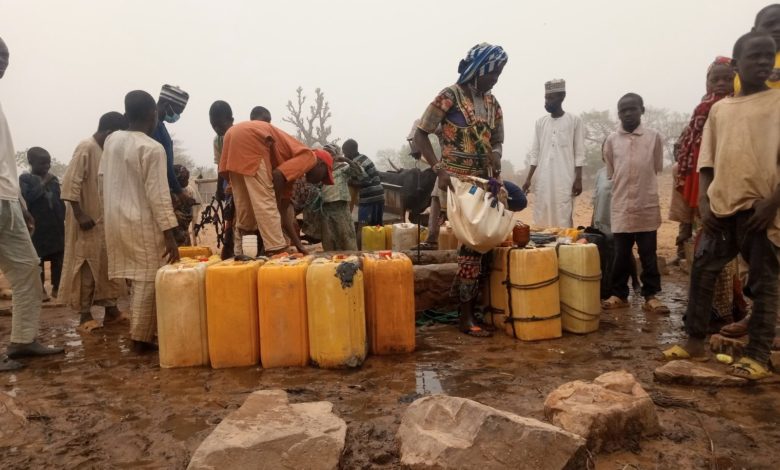Climate Change Causing Water Stress In Northwest Nigeria
More Nigerians are feeling the effects of climate change as water sources are drying off due to the advancing Sahara desert.

For more than three decades, at least one million people have depended on the old Gwalaida well to fetch water for their basic needs that include drinking, washing, and cooking in Kunci Local Government in Kano State, Northwest Nigeria.
But advancing Sahara desert, induced by climate change, has made sourcing for water a struggle for survival in the local government area.
“You can see. It’s the same water we and our animals drink from,” a villager in his 60s, told journalists in a video.
“It’s so impure that drinking it causes rashes,” he said. But that’s the only water they can give to their children. “Our donkeys, camels and, if you can stay longer I’m sure you’ll find our dogs drinking from this water.”
Often, the villagers travel long distances on a motorcycle for three hours or sometimes trek through sharp sand for hours to fetch some murky water full of impurities from the only well serving 50 villages.
Efforts by them to make their elected representatives provide clean and potable water have yielded no results.
“We reached the states and local governments officials several times but nothing was done as you can see,” a youth who spoke to a local media lamented.
He called on non-governmental and charity organisations to help in drilling a borehole that will ease their difficulties.
A large number of children are also missing schools while they assist their parents in search of water. At some places, they spend a whole night before they get a gallon of water and the process is repeated another day.
According to UNICEF, nearly one-third of Nigerian children lack access to drinking water. A large number of children live in places with high or extreme water vulnerability.
Poor sanitation and hygiene leads to high rates of diseases like diarrhoea, pneumonia, trachoma, and worm-related illnesses, with diarrhoea being the second-largest direct cause of child mortality
A video taken in Karofin-Yashi of Rimin Gado Local Government Area of Kano State, shows a mother giving her child contaminated water to drink; from the same riverside she put her legs in.
https://twitter.com/aliyussufiy/status/1375419469984641024?s=21
About 100,000 children are said to be dying annually of water-related diseases. Most of these children are from rural areas where politicians only visit during election campaign period.
“The world’s water crisis is not coming — it is here, and children are its biggest victims,” said Peter Hawkins, UNICEF’s representative in Nigeria.
He added that “When floods hit, children fall ill from waterborne illnesses. And when water is not available in Nigerian communities, children cannot wash their hands to fight off diseases.”
The Effect of Climate Change
Research has shown that rainfall in Nigeria has decreased by 92 mm and the temperature increased by 0.8 degrees since 1960. Northwestern Nigeria is the worst hit.
From the 1970s, the Northwestern region has experienced frequent droughts as a result of climate change, and the Sahara has steadily advanced into it, causing the desertification of an estimated 351,000 hectares of land annually.
Research conducted last year has shown how the sharp climate change is affecting lakes and other water sources causing water stress in villages and towns.
Observers have associated water challenges with insecurity in northern Nigeria, mostly in the Northwest where farmers-herders clashes persist.
Climate change is increasing the risk of violent conflicts through clashes over resources, and boosting the recruiting appeal of non-state armed groups and other criminal gangs.
Despite these challenges, Nigeria was ranked 12th country least ready to deal with the impacts of climate change. A prediction has shown that weather patterns will continue to become more volatile and more severe.
Improve Water Management, Confront Climate Change – NGO
The Society for the Promotion of People’s Right, a nonprofit operating in Nigeria, urged all tiers of government and relevant stakeholders to improve on water management to curb the menace of climate change.
Williams Osaze, president of the organisation, in an interview with the News Agency of Nigeria (NAN), urged the government and relevant stakeholders to put more efforts into ensuring that Nigerians have access to clean water and a conducive environment.
He associated the erratic rainfall and the eventual water stress to climate change and added that water management is getting difficult because of population growth thereby causing difficulties in accessing clean water.
“As climate change makes rainfall more erratic and increases the risks of floods and droughts, investing in better water management and infrastructure is becoming even more important,” Osaze said.
“The impact of climate change on people’s water supplies is being overlooked. Unless urgent action is taken to help the communities adjust to changing weather patterns.”
“These investments can strengthen economies. When targeted at the poorest people, they offer a triple surplus, alleviating poverty, supporting jobs and growth, and reducing vulnerability to climate change.”
Access to clean water and a healthy environment, he emphasised would help communities cope with climate change and recover quickly from related extreme weather.
He added that water is a fundamental human right and an essential step towards improving living standards.
Support Our Journalism
There are millions of ordinary people affected by conflict in Africa whose stories are missing in the mainstream media. HumAngle is determined to tell those challenging and under-reported stories, hoping that the people impacted by these conflicts will find the safety and security they deserve.
To ensure that we continue to provide public service coverage, we have a small favour to ask you. We want you to be part of our journalistic endeavour by contributing a token to us.
Your donation will further promote a robust, free, and independent media.
Donate HereStay Closer To The Stories That Matter




